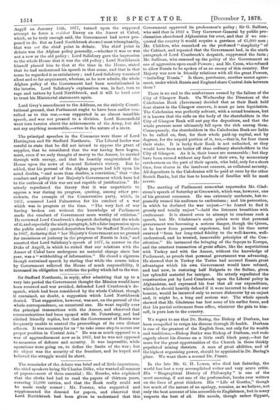The principal speeches in the Commons were those of Lord
Hartington and Sir Stafford Northcote. The Liberal leader was careful to state that he did not intend to oppose the grant of supplies, that he considered that the war having been begun, must, even if we only thought of mercy to the Ameer, be carried through with energy, and that he heartily congratulated the House upon the news of General Roberts's victory. But he added, that his perusal of the Afghan papers had left upon his mind doubts, "and more than doubts, a conviction," that "the conduct and policy of her Majesty's Government which have led to the outbreak of this war are not capable of justification." He utterly repudiated the theory that it was unpatriotic to oppose a war during its progress, quoting, among other pre- cedents, the example of the Conservative party, which, in 1857, censured Lord Palmerston for his conduct of a war which was in progress at the time. "The very fact of war having broken out without the knowledge of Parliament made the conduct of Government more worthy of criticism." He reviewed Lord Cranbrook's despatch declaring that the whole of it, and especially the ninth paragraph, left a false impression upon the public mind ; quoted despatches from Sir Stafford Northcote in 1867, declaring that " her Majesty's Government see no ground for uneasiness or jealousy in the progress of Russia in Asia," and asserted that Lord Salisbury's speech of 1877, in answer to the Duke of Argyll, in which he stated that our relations with the Ameer of Cabul have undergone no material change since last year, was a " withholding of information." He closed a vigorous though restrained speech by stating that while the course taken by Government relieved the House of much responsibility, it increased its obligation to criticise the policy which led to the war.






































 Previous page
Previous page